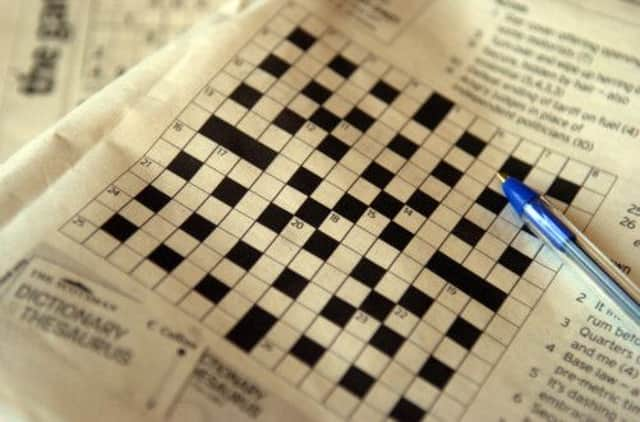Lori Anderson: The crossword comes of age


What’s black and white and for 100 years has been read all over? The crossword puzzle. Or as I like to call it, dominos for intellectuals. You can guess that the crossword causes me some consternation, that matrix of black and white boxes is more confusing to me than Last Night at Marienbad, a cinematic puzzle that shares the same stark colour scheme. Winston Churchill described Russia as a riddle, wrapped in a mystery inside an enigma, and for me it’s also an apt description for the crossword itself, even though I doubt Britain’s most literary prime minister was frequently stumped by No 2 across.
Every time I start, it is with the high hopes of the amnesiac for whom past failures are quickly forgotten. I like the idea of crossword puzzles, of the erudite confidence projected by those who make their mark in pen, rather than hesitant pencil. It is the head pounding, eye-rolling reality that I find so frustrating as my fantasy of a swift completion crumples into the daunting rock face of the first clue.
Advertisement
Hide AdAdvertisement
Hide AdI’m also partial to the eclectic company crossword puzzlers keep. King George VI completed a crossword puzzle in bed then died in his sleep. Today, his daughter, the Queen begins each morning with kippers and the Telegraph’s crossword, although I do hope it is The Scotsman’s while she’s at Balmoral. Ian McCulloch of Echo and the Bunnymen is an aficionado while Frank Sinatra once wrote to the New York Times, saying of the paper’s daily puzzle: “What a wonderful way to pass the time and also learn new answers every day.”
Next month, on 21 December, it will be exactly 100 years since the first crossword puzzle, or “word cross” as it was then known, appeared in New York World newspaper. The puzzle was devised by Arthur Wynne, who was born in Britain, the son of the editor of the Liverpool Echo. As he never patented the idea, other papers such as the Boston Globe followed up on its popular success and within a few years America was hooked.
The New York Times, which had yet to be seduced, complained at the time of the “sinful waste in the utterly futile finding of words, the letters of which will fit into a prearranged pattern, more or less complex. This is not a game at all, and it hardly can be called a sport… [puzzlers] get nothing out of it except a primitive form of mental exercise, and success or failure in any given attempt is equally irrelevant to mental development.”
It is said that if America sneezes, Britain will soon catch a cold and it was not long before the Times was warning its readers of the transatlantic contagion. In an article in December, 1924 with the headline: An Enslaved America the paper argued that the crossword “has grown from the pastime of a few ingenious idlers into a national institution: a menace because it is making devastating inroads on the working hours of every rank of society. Everywhere, at any hour of the day, people can be seen quite shamelessly poring over the checker-board diagrams, cudgelling their brains for a four-letter word meaning ‘molten rock’ or a six-letter word meaning ‘idler’, or what not…”
The paper claimed that five million man hours were being lost each day and it was also reported that the puzzle had broken up homes as husbands spent too long figuring out clues instead of working.
After they arrived in Britain it was reported that dictionaries in Wimbledon were being damaged by people frantically looking up clues, while at Dulwich library staff blacked out the boxes to prevent customers being distracted from the news by the puzzle.
In Britain, speed of completion was what fascinated people. M R James, the provost of Eton, who also wrote celebrated ghost stories, said that he completed the Times crossword puzzle in the time it took to cook a soft boiled egg. E V Lucas, the comedy writer, said that had tried to match James’ speed: “I started at 8am and it is now 15:05 and the egg has burst.” Norman Mailer said the daily crossword was how he “combed his brain every morning”.
Over the past 100 years the crossword has moved from a black and white delinquent, encouraging employees to waste time in a foolish pursuit of cryptic clues, to practically a prescription against dementia and an aid to ensuring an active brain. Yet it remains one of those statements generally accepted without any supporting evidence. What is curious is that cryptic crosswords can have an effect on one’s memory, but not in a good way. An article published in the journal Perception said that eye witnesses should be discouraged from tackling cryptic crosswords prior to an identity parade as it had a detrimental effect on facial recognition which ordinary crosswords and sudoku did not.
Advertisement
Hide AdAdvertisement
Hide AdAccording to a brilliant new book on the crossword, by Alan Connor, there is no evidence that the puzzles are beneficial to the brain. He quotes a paper entitled Predictors of Crossword Puzzle Proficiency and Moderators of Age-Cognition Relations that stated: “The results provide no evidence to suggest that amount of crossword puzzle experience reduces age-related diseases in fluid cognition or enhances age-related increases in crystallised cognition.”
Instead research suggests that as players age their ability to retain vocabulary and solve acronyms improves, but they find it more difficult to tackle ambiguities. The author argued that in old people’s homes it was a more socially beneficial pursuit than Sudoku as shouting out clues can spark conversations, laughter and anecdotes. Or, I suspect that for me, my plaintive cries for assistance will be met by stony silence. “Three letters, begins with ‘c’, domestic pet… anyone?”